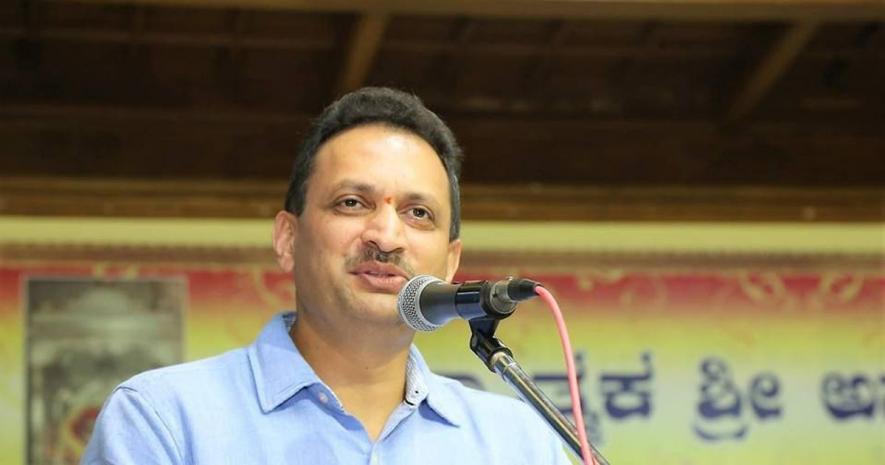How Not to Hollow Out the Constitution Bit by Bit

Image Courtesy: The Wire
“Line wahan se shuru hoti hai jahan ham khade rehte hain” (The queue starts from the point where we stand).
Remember that 70s Bollywood film where teh then bad boy of Hindi cinema (Shatrughan Sinha) barges into a long que inside a jail and makes this claim in his roaring voice.
One was reminded of this scene when news came in that Anantkumar Hegde, a minister in PM Modi’s Cabinet, claimed that “we are here to change the constitution” itself.
It looked rather strange, to say the least, to see someone who has taken oath of the august document – prepared by the finest brains of independent India who had sacrificed their lives for its political and social emancipation – suddenly declare that he and his people were there to break those established rules and make their own.
The said minister is not new to controversies.
It was only last year that police had registered a suo motu case against him for insulting religious beliefs with the intention of stoking communal violence.
Last month he was in the news again when he compared the legendary king of then Mysore state Tipu Sultan – who died on battlefield fighting the Britishers, perhaps the only king to do so – with Ajmal Kasab.
This denigration of the Constitution – which was called a “direct assault” on the composite, diverse and secular identity of the nation – has been widely condemned.
Demands were also raised by sections of civil/political society to take action against him.
People hoped that PM Modi, who is reported to have called the Constitution the “most sacred book” while assuming charge and who likes to call himself the “disciple” of Dr Ambedkar, would break his silence and would censure Hegde at the very least.
But nothing happened, apart from a meek clarification of sorts from the government that it “dissociates itself from Mr Hegde’s view” and that he had made the controversial statement in his individual capacity
The immediate context of this statement was not lost on people as Karnataka is getting ready for assembly elections next year.
With Chief Minister Siddaramaiah of the Congress firmly in power as of now, the BJP is losing nerve because of infighting within its top leadership at the state level.
And with the lingering Lingayat issue – with the community demanding that they be recognised as belonging to a separate religion – putting a dent in their vote bank, chances of polarisation attempts were already in the air.
Hegde’s latest statement, where the minister asked people to identify themselves by their religion and caste and made a mockery of seculars, provided an inkling of things to come.
While the minister called Manusmriti a document of the past, he is also reported to have termed the Constitution as ‘Ambedkar Smriti’, leaving no one in doubt about his intentions.
To be fair to Mr Hegde, it is not for the first time that such a statement has been made by someone owning allegiance to the saffron Parivar.
In Spetmebr, RSS supremo Mohan Bhagwat had “[p]itched for changes in the Constitution and jurisprudence in line with the value systems of the country” while addressing Akhil Bharatiya Adhivakta (Advocates) Parishad in Hyderabad.
Time and again one comes across such statements where the Indian Constitution is derided for ‘Western influence’ and neglecting ‘Indian (read Hindu) values’ by them.
Of course, mere statements do not provide a complete picture of the surreptitious manner in which the powers-that-be are engaged in hollowing out constitutional principles or trying to subvert it by imposing upon the whole country their ideology of majoritarian tyranny.
The manner in which the right to life of the bovine is gaining precedence over the right to life of human beings (Article 21 which provides for the protection of life and personal liberty).
The killing of innocents by Right-wing goons – thanks to the support they receive from various BJP-led governments as well as the laws enacted and measures taken by the said government – is a case in point.
One can even look at instances of involvement of the Army in religious functions, severly impacting its secular character, and not forgetting that secularism is part of the basic structure of the Constitution.
Or even changes being sought in the Citizenship Bill – where plans are afoot to grant citizenship rights to Hindu refugees and turning India into a “a natural home for persecuted Hindus” – could be cited among the random examples which make the RSS-BJP’s agenda crystal clear.
One can see that provisions in the bill (Citizenship Amendment Bill 2016) blatantly ignore Muslims in the protection clauses and mention religious minorities only in Muslim-dominated countries.
A cursory glance at the BJP’s own trajectory reveals the systematic manner in which it is going about this agenda.
Remember, when Atal Bihari Vajpayee was Prime Minister of India, the BJP had immediately appointed a commission headed by Justice (retd) Venkatachaliah to review the Constitution.
Looking at the fact that the then NDA government led by Vajpayee did not have enough numbers it could not push for discussing the review on the floor of the Parliament.
Also, it is worth recalling that the earlier three election manifestoes of the BJP had included a review of the Indian Constitution.
Their continued disapproval of the Constitution that overturned the centuries-old code of conduct prescribed by the Manusmriti – which denied human rights to the vast majority of women and the depressed castes – and put each individual and her/his autonomy at the centre is a reflection of their never-ending fascination for the Manusmriti and its edicts. It is also why they strongly refused to have a new Constitution at the time of Independence.
When leaders of the newly independent India were struggling to have a Constitution that was premised on the inviolability of individual rights, with special provisions of positive discrimination for millions of Indians who had been denied human rights by those quoting religious scriptures, it was Golwalkar who espoused the same Manusmriti as independent India’s ‘Constitution’.
The RSS mouthpiece ‘Organiser’ (November 30, 1949, p.3) complained:
But in our constitution there is no mention of the unique constitutional developments in ancient Bharat. Manu’s laws were written long before Lycurgus of Sparta or Solon of Persia. To this day laws as enunciated in the Manusmriti excite the admiration of the world and elicit spontaneous obedience and conformity. But to our constitutional pundits that means nothing.
Vinayak Damodar Savarkar, a leading light of the Hindu Right, who is supposed to be the pioneer of the ideology of Hindutva, has expressed his admiration for Manusmriti in no uncertain terms, questioning the need for a new Constitution. According to him:
Manusmriti is that scripture which is most worshippable after Vedas for our Hindu nation and which from ancient times has become the basis of our culture-customs, thought and practice. This book for centuries has codified the spiritual and divine march of our nation. Even today the rules which are followed by crores of Hindus in their lives and practice are based on Manusmriti. Today Manusmriti is Hindu law.
KR Malkani, a leading ideologue of the RSS, admits in his book ‘The RSS Story’, that Golwalkar, the second supremo of the RSS, ‘saw no reason why Hindu law should break its ancient links with the Manusmriti’.
Similarly, in his ‘Bunch of Thoughts’, Golwalkar, quoting from the Rig Veda and echoing Manu, empathically declares:
‘Brahmin is the head, Kshatriya the hands, Vaisya the thighs, and Shudras the feet. This means that the people who have this four-fold arrangement, the Hindu people, is (sic) our God'.
It was not surprising that Golwalkar did not take kindly to the affirmative action programmes undertaken by the newly independent state for the welfare and empowerment of the scheduled castes and the scheduled tribes. He expressed his disapproval by saying that rulers were digging at the roots of Hindu social cohesion and destroying the spirit of identity that held various sects into a harmonious whole in the past. Denying that the Hindu social system was responsible for the plight of the lower castes, he instead held constitutional safeguards for them as responsible for creating disharmony.
Dr Ambedkar had envisaged the special privileges for ‘Scheduled Castes’ for only 10 years from the day we became a Republic in 1950. But it is going on, being extended. Continued special privileges on the basis of caste only are bound to create vested interests in them in remaining as a separate entity. That would harm their integration with the rest of the society.
It was the same period when attempts were made to give limited rights to Hindu women in property and inheritance through the passage of the Hindu Code Bill., which were opposed by Golwalkar and his followers, with the contention that this step was inimical to Hindu traditions and culture.
It is now history how the bill could not be passed when Ambedkar was the law minister and he resigned from the Cabinet mainly on these grounds.
Although much water has passed through the Ganges (and the Jamuna and the Kaveri as well as Godavaris), it cannot be said that there is any rethinking in the camp of Hindutva about the Manusmriti or the social system sanctioned by it.
The only difference that has emerged is that the critique of the present Constitution – which, at least formally, “ended the days of Manu” (to quote Dr Ambedkar) – has become more sophisticated.
Of course, there are occasions when the criticism does not remain so guarded and it manifests itself in a blatant manner.
One still remembers how Giriraj Kishore, an RSS pracharak, who happend to be a leading light of the Vishwa Hindu Parishad, had rationalised the killings of five Dalits in Jhajjar, Haryana (October 2002) by a mob for committing the “crime” of skinning a dead cow by saying that “in our religious scriptures (Puranas) life of a cow is more important than any number of people.”
It is now history how the MP government led by Uma Bharti (then a senior leader of the Bharatiya Janata Party) promulgated an ordinance for banning cow slaughter with an official statement which extolled the virtues of Manusmriti (Janurary 2005). It said:
Manusmriti ranks the slaughterer of cow as predator and prescribes hard punishment for him.
It was for the first time in the legal history of independent India that a law was being justified for being in tune with the Manusmriti. It had no qualms in declaring its committment to the Manusmriti although it very well knew that it was in contravention of the basic principles of the Constitution.
It is the same BJP that helped install a magnificient statue of Manu in the precints of Jaipur High Court in the early 90s when Bhairon Singh Shekhawat – a longtime RSS worker and former Vice President – happened to be the Rajasthan Chief Minister.
The same Jaipur witnessed a massive programme recently where Indresh Kuman, a leading ideologue of the RSS was chief guest, and which once again extolled the “virtues of Manusmriti”.
Undoubtedly, Anantkumar Hegde is in good company.
Get the latest reports & analysis with people's perspective on Protests, movements & deep analytical videos, discussions of the current affairs in your Telegram app. Subscribe to NewsClick's Telegram channel & get Real-Time updates on stories, as they get published on our website.
























